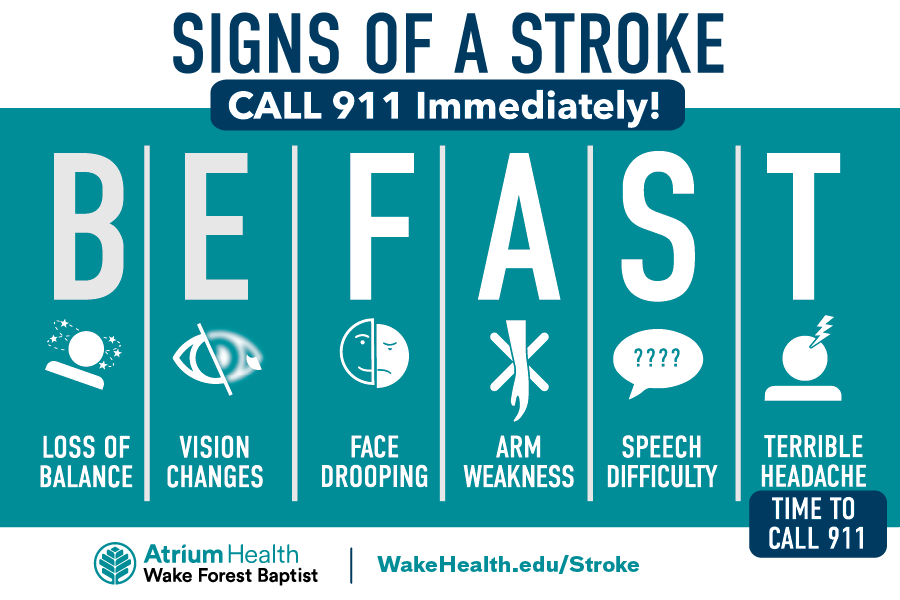If you suspect you or a loved one are experiencing a stroke, call 911 immediately.
Wake Forest Baptist often treats people who did not recognize stroke symptoms and signs.
When it comes to stroke, time is always of the essence. The faster you get treatment for a stroke, the better chances you have for recovery.
“People who don't know what a stroke is may lie down to sleep thinking it will get better or avoid calling 911 because of the concern that an ambulance is too expensive. However, doing either one of these things right after the onset of stroke symptoms will delay treatment,” said Cheryl Bushnell, MD, associate professor of neurology at Wake Forest Baptist. “Recognizing the symptoms and signs is critical in order to receive treatment in the window of 3 to 4 1/2 hours.”
Bushnell suggests that everyone know the following signs of a stroke, what to do if someone is experiencing a stroke, and how to reduce your risk of having a stroke in the first place.
Stroke symptoms and Warning Signs
Recognizing stroke symptoms and signs and acting quickly can literally save your life. The 5 most common warning signs of stroke are:
- Sudden numbness or weakness of the face, arm or leg, especially on one side of the body
- Sudden confusion, trouble speaking or understanding someone speaking to you
- Sudden trouble seeing in one or both eyes
- Sudden difficulty walking, dizziness or loss of balance
- Sudden severe headache with no known cause
Call 911 or visit the nearest emergency room if you have any of these stroke symptoms. Every minute is important.
Recognizing Signs of a Stroke in Others

Reduce Your Risk of a Stroke
If you are over the age of 55, have high blood pressure, high cholesterol, diabetes, heart disease, smoke, or are an African American, you are at risk for a stroke.
Although some of these risk factors are beyond our control, others are influenced by lifestyle. Here are ways to reduce the risk of stroke:
- Control blood pressure.
- Normal blood pressure is considered below 120/80.
- A blood pressure between 120/80 and 139/89 is considered pre-hypertension. High blood pressure is 140/90 or higher.
- Maintain healthy cholesterol levels.
- LDL (bad cholesterol) should be below 100.
- HDL (good cholesterol) should be above 40.
- Total cholesterol below 200 is optimal.
- Control sleep disorders, especially sleep apnea.
- Don't smoke.
- Avoid excessive alcohol consumption.
- Limit to no more than 2 drinks a day for men and 1 drink a day for women.
- 1 drink is equal to 12 ounces of beer, 5 ounces of wine, or 1.5 ounces of hard liquor.
- Maintain a healthy weight and know your body mass index (BMI).
- A healthy BMI is between 19 and 24.
Visit the Comprehensive Stroke Center for more information and remember that you can reduce your chances of having a stroke by following the 3Rs:
Reduce risk factors.
Recognize stroke symptoms early.
Respond by calling 911 and seek emergency treatment within the first 3 hours.
